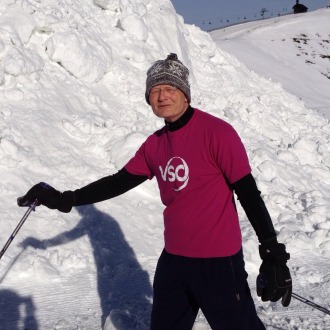Battling the North Pole to help women battle maternal mortality

In 1968, two years after qualifying, I applied to be a volunteer with VSO (Voluntary Service Overseas); and they rejected me. It was a good decision; I needed to grow up. After 40 years in the NHS I retired as professor of primary care and applied again in 2007. This time VSO accepted me and I was sent to Cambodia for two years to help tackle high rates of maternal mortality. It was another very good decision!
My years as a volunteer in Cambodia and South Sudan were some of the most rewarding of my life. Now I intend to help VSO in a different way. I have set myself two big challenges. The first is to ski to the North Pole; the second, to raise £30,000 in sponsorship for VSO’s work. The second challenge currently feels greater than the former!
Setting off in April as part of a team of four, I’ll be skiing for around eight hours a day, pulling all I need on a sledge. We’ll face temperatures as low as minus 45 degrees centigrade and the threat of polar bears. It will be a physical, emotional and mental challenge.
I’m asking people to support my efforts by donating whatever they can (www.justgiving.com/phil-heywood). All money will go towards VSO’s work, ensuring that it can keep on sending doctors, nurses, midwives and teachers overseas to share their skills in some of the world’s poorest communities.
I know from my own experience the value of VSO’s work. Back in 2007, VSO had been trying unsuccessfully to recruit an obstetrician or midwife for a vacancy in a maternal and child health NGO in the country. I was very interested in the vacancy, knowing that worldwide more than 800 women per day die in pregnancy or childbirth. Five months later, I was arriving in Phnom Penh with a group of fellow volunteers – all ages, many backgrounds – to start working for the Reproductive and Child Health Alliance of Cambodia (RACHA).
I spent a lot of time in meetings with obstetricians, midwives and nurses as the only person with significant community experience. I felt empowered by being different. I was able to say things that the others had never thought about. For example, I told them that it is easy to work in a hospital surrounded by supportive colleagues. In contrast, working alone in the most remote places is hard; therefore the best, most-experienced practitioners should be encouraged to work there, not the weakest, newest graduates.
My most useful and interesting times were working with Cambodian colleagues, learning how they did things, showing them how I did things, demonstrating my approach to solving problems, running small workshops and generally helping them to work more productively.
The year after I returned from Cambodia, VSO needed experienced volunteers to help open their new office in South Sudan. I was there for two months in the spring of 2012 working with the Government Ministry of Health on nurse training and visiting some of the states to identify placements for future VSO health volunteers. Unfortunately, due to the recent violence, VSO has had to suspend its work in the country and safely relocated its volunteers; but I hope they will be able to return in the not too distant future.
But now comes a very different, and significantly colder, challenge. I’m told I shall be the first professor to ski to the North Pole! Thereafter, I hope to return to international health development and work to reduce maternal mortality. It may be with VSO; they are always looking to recruit experienced health professionals, although short term placements are few so it may be with another agency that I can make a difference. Either way, I love a future with unknown possibilities.
About VSO:
International development charity VSO provides health professionals of all backgrounds with the opportunity to volunteer and improve the quality of healthcare in some of the world’s poorest countries. Volunteering internationally gives health professionals the opportunity to develop new skills, respond to a broad range of challenges, and learn to do more with less. Volunteers don’t just save lives; they pass life-saving skills on so that long after they return home, health workers in developing countries are able to make a large scale difference to people’s lives.
VSO is currently recruiting for doctors, midwives, nurses and health managers to help tackle urgent challenges in maternal health care in various countries across Africa and Asia. Generally volunteers will need two to six years of relevant professional experience, a professional qualification and some experience of supervising, mentoring or project management. VSO further supports volunteers by providing them with comprehensive training and covering the costs of flights, accommodation and a basic living allowance.
To find out more about the wide range of roles in various specialities across more than 30 developing countries and how to volunteer, visit www.vso.org.uk
Visit Pulse Reference for details on 140 symptoms, including easily searchable symptoms and categories, offering you a free platform to check symptoms and receive potential diagnoses during consultations.









